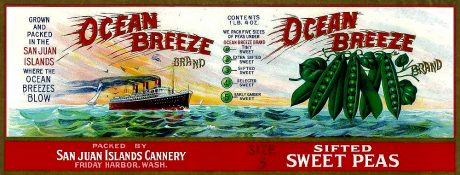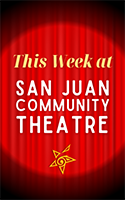From Camas to Oysters (and “Please pass the peas.”)
Posted March 25, 2020 at 5:45 am by Peggy Sue McRae
Here’s this month’s history column from the San Juan Historical Society and Museum…

San Juan Islands Cannery Label – Contributed image
Here’s a little trivia question for you: When did farming first begin on San Juan Island? If you said “about 1850” or “with Hudson Bay Company’s Belle Vue Sheep Farm” you would not be alone, but that’s not quite early enough. Too often overlooked is the earlier history of Native American camas cultivation in this region, including on San Juan Island.
Coast Salish farming operations, traditionally inherited and maintained by women, also included other edible roots such as wild carrots and rice root. Meadows under cultivation were well established by the time Euro-American trading posts were built in the early 1800s and began to influence Native farming methods in the Pacific Northwest. Then, with cross-cultural marriages between Coast Salish women and men of European descent, newly arrived settlers learned proven farming techniques for this climate and soil from their wives. To read about the history of Coast Salish root crop cultivation, check out an excellent History Link article by Russel Barsh and Madrona Murphy.
The Hudson Bay Company established Belle Vue Sheep Farm with a starter flock of 1,369 sheep on the southern end of San Juan Island in 1853, laying the foundation for why present-day islanders know all about a potato patch, a hungry pig (actually a boar), and the ensuing Pig War. There was also a lot of family farming that grew (pun intended) into industrialized, large-scale operations during the homesteading era and beyond. This is but a short column, so we will leave the larger story of livestock, dairying, crops, and orchards for another time and move right on to peas.
Although dry peas had been grown on the island since the mid-1800s, it wasn’t until 1922 that things really took off. This is when John “Pea” Henry introduced the planting of vines for green peas. On behalf of investors, he eventually bought up over 1,000 acres of valley farmland for planting and soon opened Friday Harbor’s San Juan Islands Cannery. This took over a former salmon cannery and produced the “Salt Air” brand of canned peas. We do not have a surviving label to share for illustration, but we offer the same cannery’s beautiful “Ocean Breeze” label, pictured above. Production was robust until the late 1930s when infestations of aphids and the pea leaf weevil led to the final decimation of crops in 1940. Major pea production returned just once more in 1956, for a revival of ten years by the Friday Harbor Canning Company and George Jeffers.
This brings us to the world-renowned oysters of Westcott Bay. Farmed on tidelands since 1978 for family-run Westcott Bay Seafarms, this aquaculture farm nearly went the way of the island pea industry when the property went on the market decades later. Fortunately, it was revived in 2013 as Westcott Bay Shellfish Company in and is still locally owned.
Another type of specialty farming contributing to our island culture is, of course, lavender growing. With the first 2,000 or so plants placed in rows in 1999, Pelindaba Lavender Farm changed how many viewed island agriculture going into the future.
There are well-researched books available to guide one’s journey into the history of farming on San Juan Island. Find them at the San Juan Historical Museum, in local shops, and at the San Juan Island Library. Two of our favorite books are Island Farming by Boyd C. Pratt and Images of America: San Juan Island by Mike and Julia Vouri.
Many places excel with livestock, crops, and orchards. Where else but San Juan Island is also known for such a unique history with camas, peas, oysters….and lavender?
You can support the San Juan Update by doing business with our loyal advertisers, and by making a one-time contribution or a recurring donation.
Categories: Around Here










No comments yet. Be the first!
By submitting a comment you grant the San Juan Update a perpetual license to reproduce your words and name/web site in attribution. Inappropriate, irrelevant and contentious comments may not be published at an admin's discretion. Your email is used for verification purposes only, it will never be shared.